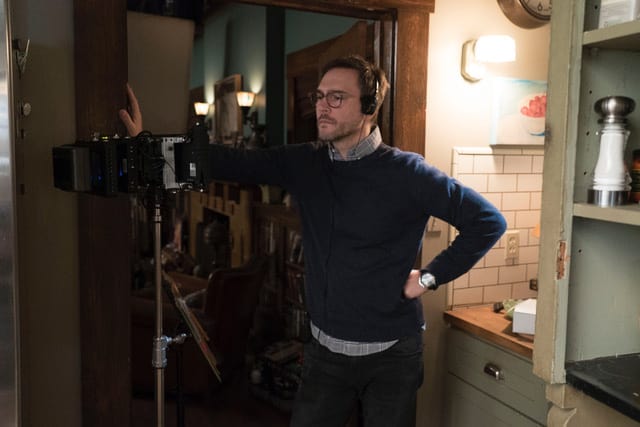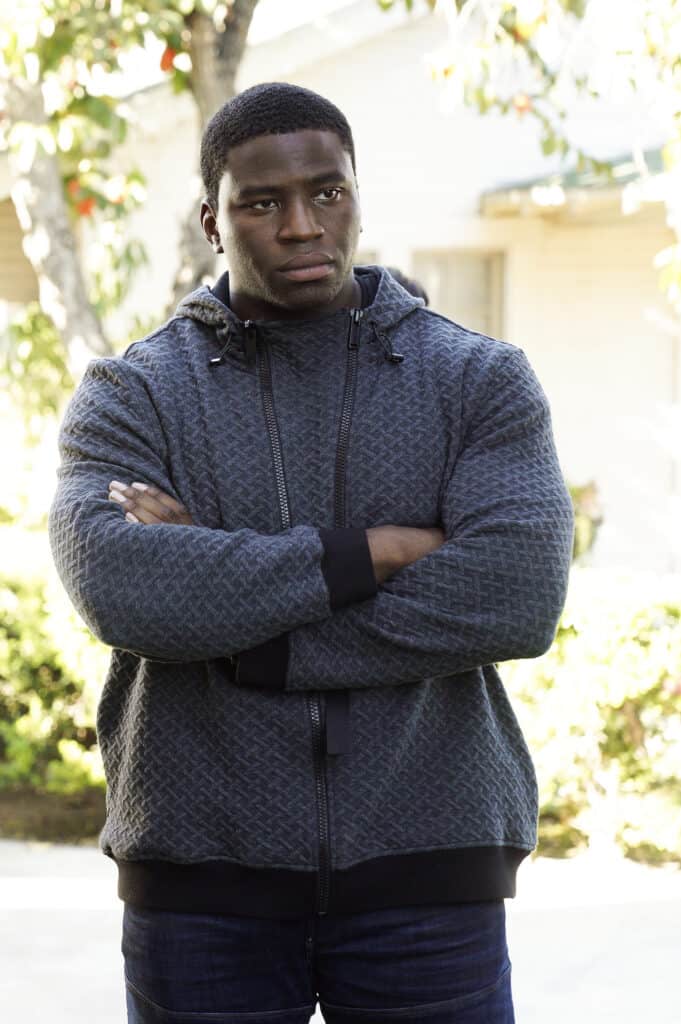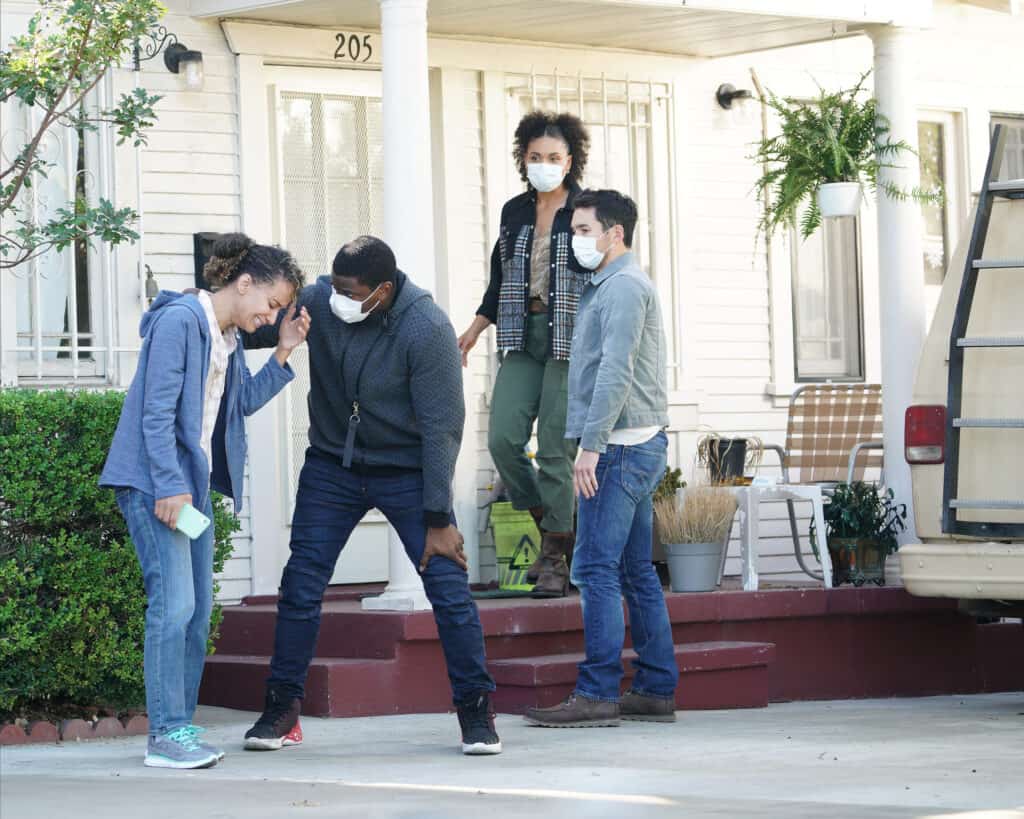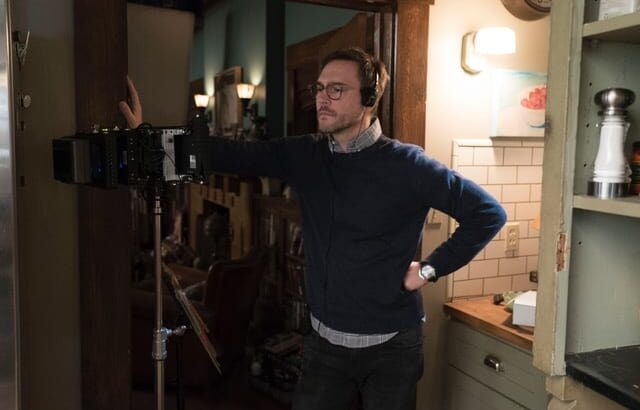Have you ever sat for a virtual interview with someone you've never met and IMMEDIATELY felt right at home after introductions? That's what happened when I conducted an interview with Michael Medico, the director of the fall finale of one of my pandemic faves - Station 19.
Michael Medico, who is an acclaimed director with credits that include Grey’s Anatomy, The Fosters, Atypical, and Good Trouble, and I sat for almost two hours chatting about how he got his start, how he approaches directing, and a bit about the state of the world today. It was a great and insightful conversation, and I look forward to interviewing him again.

His directorial debut
Believe it or not, his directorial debut came on a dare from fellow Boston University alumna, and Station 19 current showrunner Krista Vernoff. However, before that, he was an actor for several years, and he has a TON of commercials under his belt to show for it.
What drove that passion though is something that I wanted to know. He and I found that we had similar things that pulled on our talents for our communities. I have the We Sow We Grow Project and in 2006 he started with Hot In Hollywood, an AIDS benefit that he created to raise $5000. An audacious goal for him at the time. In that first year though, he raised $75,000 along with a veritable who's who of Hollywood coming and lending their support. It's also where he met Sophina Brown - the mother from episode Station 19's 405 Out of Control - who sang for the third Hot in Hollywood benefit. Talk about full circle.
*you may know Sophina Brown from various roles that she's played, but *I* will always have a place for her as Nikki Betancourt, former LAPD officer turned FBI agent in Numb3rs*
In the middle of major life changes after Hot in Hollywood was nearing its end, and family dynamics were changing, Krista Vernoff navigated that time with him as only a true friend can. She invited him to her Oscar party but there was a caveat - he had to create a 1-minute movie that would be screened during commercials. His gut reaction was to list off the dozens of things that could have easily held him back from the twist in time, but he realized, he is who he is, and not what he does.
*side-note - that statement legit makes me want to tear up for so many reasons, because how many of us rate ourselves on what we do instead of who we are?*
He made his first short Bitch for less than $100 which won the Oscar party. The short then went on to win Best Short Film of 2009 by Frontiers LA Magazine. That led to other shorts, including an interesting take on Earth Day from the POV of a couple and more. All of these connections, as small as they may have seemed to him at the time led to him shadowing Tony Phelan of Grey's Anatomy and directing five more pretty intense projects, including a web series titled Paige A Day which caught the eye of Peter Paige who gave Michael his first directing gig on television. A little TV show you may have heard of called The Fosters.
He set his sights on making Debbie Allen proud and ended up shadowing her and working for her on Grey's Anatomy and now Station 19. I'm cutting out a LOT of his journey because of space, but know this, he worked his behind off to get where he is and STILL acknowledged that the pendulum hasn't swung far enough for women and people of color. This brought us to the first of two episodes of Station 19 that he directed titled Out of Control. In this episode we see some pretty tough situations arise, and as with so much of what's going on in our country these days, race and sex play a large part of it.
I'll admit, I'm late to the Shondaland show, as I found that I couldn't keep up with weekly viewing of shows any longer, but after seeing Okieriete Onaodowan in Hamilton last year, I was compelled to see other works of his, and through my fandom of his, I was introduced to Michael - or his work at least. So there you have it. Since Okieriete's character, Dean Miller was the center of this episode, it's only right that he was the introduction to Medico.

I meant to attach this photo as well...#station19 writer Tyrone Finch (in suit) director @MichaelMedicoLA (in t-shirt). Excellent work by them in tonight’s episode... https://t.co/NxVpYNEaBp pic.twitter.com/2ufVXp8uZk
— Paris Barclay (@Harparbar) December 18, 2020
You'll find that I'm not really shy when I love something, and I have no problem letting the folks who are responsible know that I think their craft is great. That's how I 'met' Onaodowan on Twitter and then found the rest of the cast and crew to chat with in between. After viewing Out of Control, I tweeted Michael and stated that I wanted to talk to him about the process that he had to go through in directing this episode, and he happily agreed. There you have it. Below, you'll find the bulk of our conversation. Did I mention I could have talked with him for another two hours?
For those that don't know Station 19 is the spin-off of Grey's Anatomy and follows a group of heroic firefighters of the Seattle Fire Department at Station 19 from the captain down the ranks to the newest recruit in their personal and professional lives.
Maybe I'm still raw from the loss of my brother, or this is how everyone starts their forties, but so many of these episodes have reduced me to tears or had me laughing my fool head off, and for that I'm grateful. You can even see my progression of binge-watching it last year under the hashtag #GetOaksHouse - it's a thing.
How did Michael end up directing such a race heavy episode?
This was the question that I REALLY wanted the answer to. It seemed interesting to me that they would pick a white man to direct an episode about the sex-trafficking of Black girls AND the racial microaggressions thrown towards the mothers by the Seattle Police officers called to the scene.
Long story short, directors are given slots, and you don't know which episode you'll be directing until it's your time to come on board. Talk about a surprise, right? Even Medico was a bit surprised with the episode he pulled. However, it's hard to move directors once their spots are in their slots.
However, Paris Barclay, who serves as an executive producer, believed that Medico had the talent and ability to tell the story in a way that would stay true, and that he would do the work necessary to create art that caused conversations. And good grief, he did.
This is what prompted me to tweet at Michael because I felt SO deeply about the acting and the way the story unraveled on screen. What started as a top-of-world feeling suddenly plunged us into a pit of despair, and I'll be honest, it's the way that I had been feeling since May of 2019. Between the death of my baby brother (my SECOND sibling y'all) and the state of America with the pandemic, life felt like it wasn't letting up. It felt exactly how I imagined Sullivan and Miller felt going into this house without orders to rescue two Black teenage girls that the Seattle Police officers didn't care a bit about. Through actions and words, they told both mothers who were on the scene that they didn't take their concern for their children seriously.
Michael, who had never worked with any of the actors on Station 19 outside of Barrett Doss, acknowledged that he knew how to tell a story, beat, and human emotion, but he hasn't lived the Black experience, so he relied on those actors that the episode centered around to tell him if he was out of line with direction or not. From what I hear, that's something that's appreciated with directors, instead of them putting their foot down on the end of a "CUT!"
From the way that Barrett interacted with police officers as a Black woman to the reaction of the police towards Sullivan as his wife was pushed to the ground and Miller as he ran to help the mother of one of the teens who were kidnapped by a criminal who was humanized in a way that made me want to vomit. All these little things in that episode were so real, and so fine-tuned that for a moment one could have forgotten that they were watching fiction.
Michael made it his mission to create a line of communication with the actors knowing that he knew nothing about the lived Black experience.

Did any of the actors need to talk to someone after filming the end scene?
To my surprise, none of the actors needed to debrief with a therapist (in my head I would have needed a therapist) because they were doing a job. I'm pretty sure though - and this is my imagination speaking now - that so many of these instances have happened in their lives that telling the story isn't any different than living. Sure they have famous faces, but we've seen that sometimes, even fame doesn't keep you from being disrespected by those meant to protect you if you're Black.
What did he pull from each actor?
Jason George, who plays Ben Warrem former probie of Station 19, let him know that the character arc of one of the police officers was too in your face. Essentially, the role was written of what can only be described as a caricature of racism (editor's words) while Jason reflected that racism isn't always that blatant. Especially when it comes to interactions with police officers. So often it's an intonation. Something that you can't put your finger on, and that allows so many people to get away with it in the first place. So, that officer was toned down for television, and I assume from the visceral reaction that I had when they started interacting with the firefighters that the advice hit right where it was supposed to.
Barrett Doss, who plays Victoria Hughes, adds an interesting level of this heavy episode also has the weight of being a Black woman in this situation. Along with Sophina Brown and Dionne Audain, she's surrounded by so many male voices which often drown out their female counterparts. It was evident in the episode, where Sophina was in danger of being ignored because folks don't believe women, even less when they're Black.
Boris Kodjoe, who plays Robert Sullivan disgraced former Battallion Chief, gave insight on the reactions that the cops would have in respect to the interactions with his and Okieiriete's characters.
Speaking of Okieriete, Michael sings his praises. He stated that Okieiriete - often referred to as Oak - was anxious to get to work telling this story, because he's serious about the charge he has for being true to his community. If you think this is fluff, you should take a look at his Twitter and Instagram accounts to see. He's been on it when it comes to sparking sometimes intensely uncomfortable conversations for the sake of getting people to see the humanity in each other. While we haven't always agreed on everything, he allows his new internet sister (that's what I've dubbed myself - shut up) to be a small part of his internet family, and I'm grateful. But I digress. The talent that he brought to this specific episode was amazing. I have to admit that the little digs that he had been taking at Sullivan and Gibson, played by Grey Damon, were playing into this rich boy status and making me want to sock him squarely in his throat. I told you all that I get involved.
How long does and episode take to make?
The addition of COVID-19 to the mix of television show creation added an extra day to the filming of an episode. Usually Grey's and Station 19 take 9 days per episode, but shorter work days because of COVID adds more to the schedule. The removal of everyone BUT the actors from set when filming also adds an extra layer of things to figure out during production. Gone are the days of everyone being on set in a flurry of activity. Managing down to the minute seems to be the saving grace here.
Despite the high rates of COVID in California, production rates are super low because high standards are taken to protect everyone on set. Sure do wish we could apply those standards forcibly to everyone else. I kid. Maybe not.
How do folks know they're watching a show directed by Michael Medico
He's a lover of time lapse scenes often filmed in the same room doing different things over the course of set amount of time. He used it in one of the episodes of Atypical and is pretty cool to see.
He also loves adding unexpected aspects to scenes. Think a serious scene with just a touch of comedy, or a comedic scene with a bit of seriousness added to the mix. Go back to the scene of Jack and Inara after they consumate their relationship for the first time and every little detail after. That's a Medico thing.
How does he respect actors when it comes to scenes of intimacy?
Simple. He let's both parties know that they have a say in how far things can go in the scene. He also makes sure that the women especially feel comfortable talking to him or the intimacy coordinator about how far they are willing to go. At the end of the day, the comfort of the actors and actresses is top priority for him.
How do the actors prep for playing the role of a gay or bisexual character without being too campy?
Jay Hayden and Danielle Savre play Travis Montgomery and Maya Bishop firefighters who are gay and bisexual, and the series makes sure that they don't lead exclusively with that. He noted that the relationship between Maya and Carina reads so well on camera because the actresses who play those roles love and respect each other in real life.
Jay has made sure to bring the human side of his character to the screen instead of the sassy trope that viewers are often left with. Giving the characters a proper voice instead of creating a character OF a character is what he's going for. I think he nails it.
Does he read the comment section of articles about him?
He typically stays away from them unless the conversation is productive. Even if the comments have a different point of view from him. This episode of Station 19 certainly brought out the trolls. From folks who called every one of the actor's cop haters and race-baiters, to those who felt like the statistics that Dean shared with Vic were too intense for the moment.
What was it like working with Okieriete?
No offense to the rest of the cast, I love y'all but Oak is my internet brother, so I'm giving him a section.
Michael acknowledged that this episode was very Oak-centered. As a vehicle to push the story forward, many of the scenes were built around his reactions to other characters within the episode.
One of my favorite scene breakdowns is toward the end of the episode which ends in the arrest of both Dean and Sullivan. Michael's issue was how to get that action up and running and how to break down the actions during the course of filming during COVID to deliver the heaviness of the scene.
Thus, we're left with Dean and Sullivan and their bruised egos along with their knowledge of how close to death they came. The rest of the crew is left feeling angry and confused as they see their family torn up in seconds.
Tackling the subject of race in storytelling
As Jason George stated earlier, racism is often nuanced. So much so, that people all over the place don't believe it exists any longer. It's the reason the end of this episode which SHOULD have ended with the arrest of a man who kidnapped two teenaged girls, fully intent on selling them into a sex trafficking ring, ends with one mother and two of the firefighters in jail.
This is the part of the interview where I gush over Medico. His honoring of the subject matter and the way that he presented it on screen is what I appreciated. We spoke about how white folks need to confront their racism on a daily basis even if they think they are the LEASE racist person in the world, because their are stereotypes and biases that are ingrained that they may not think of until it's brought to their attention.
Think of all of the stories that have been trending on Twitter about cast members who had unflattering hairstyles because there wasn't anyone on set that could manage Black hair or makeup. There's something trending DAILY y'all.
Allowing the actors to stay true to what they would look like on a daily basis AND having someone on set that can actually do every type of hair and makeup represented on set is important to him.
Our conversation lasted one hour and thirty three minutes and it flew by. While I acknowledged that I'm not an entertainment journalist, I'm very appreciative of those folks who can tell stories because I love the art of a good story.
Being able to sit and talk with someone whose job is to tell the stories of so many made my day, and really sealed the fact that we are who we are, and I my friends, am a fan of Michael Medico.
Thanks for sitting with me Michael! Can't wait to chat again!
You can find Michael on Twitter, his professional site, and behind the lens of shows like Atypical, Grey's Anatomy, The Fosters, and Good Trouble.

